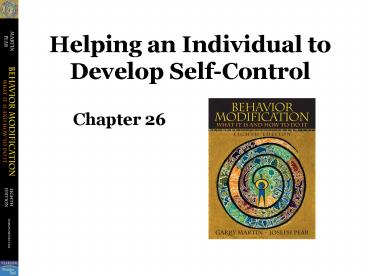Helping an Individual to Develop SelfControl PowerPoint PPT Presentation
1 / 12
Title: Helping an Individual to Develop SelfControl
1
Helping an Individual to Develop Self-Control
- Chapter 26
2
Self-Control
- Process by which individual deliberately alters
or changes his or her behavior to achieve a
specific goal - Self Administration
3
Causes of Self-Control Problems
- Problems of Behavioral Excesses
- Immediate reinforcers versus delayed punishers
for a behavior - Immediate reinforcers versus cumulatively
significant punishers for a behavior - Immediate reinforcers for problem behavior versus
delayed reinforcers for alternative desired
behavior - Problems of Behavioral Deficiencies
- Immediate small punishers for a behavior versus
reinforcers that are cumulatively significant - Immediate small punisher for behavior versus
immediate but highly improbable major punisher if
the behavior does not occur - Immediate small punisher for a behavior versus a
delayed major punisher if the behavior does not
occur
4
A Model for Self-Control
- Two parts
- Clear specification of the problem as a behavior
to be controlled - Application of behavioral techniques to manage
the problem
5
A Model for Self-Control
- Emitting a controlling behavior to effect a
change in a behavior to be controlled
6
Steps in Self-Control Program
- Specify problem and set goals
- What do you want to change and how will you know
success? - Make a commitment to change
- Statements and actions that indicate that you
want to change - Write out advantages to change and post in
visible space - Make it public
- Incorporate frequent reminders of your commitment
in your environment - Conduct assessment
- When, where, and how does a problem behavior
occur?
7
Steps in Self-Control Program
- Design and implement a program
- Manage antecedents - what are the causes?
- Instructions use self-instructions
- Modeling find someone who is good at behavior
and observe - Physical guidance may use physical barriers to
avoid some behaviors - Immediate surroundings may need to change
- Other people may need to change
- Time of day may need to change what you do at
certain times - Manage the behavior for complex behaviors, need
to focus on the behavior itself may need to
conduct task analysis and have mastery criteria. - Manage consequences eliminate reinforcers of
negative behaviors
8
Steps in Self-Control Program
- Prevent relapse and make gains last
- Be sure to define behavior clearly
- If have long-term goals, have intermittent
short-term goals to check progress - Do not over do it
- Try to avoid setback situations
- If cant recognize setback situations in advance,
have coping strategies - Do not overreact to setbacks
- Avoid counterproductive self-talk
- Incorporate everyday rewards into the program
- In programs where consequences are only
cumulatively significant, plan postchecks and
have specific strategies to follow if the
postchecks are unfavorable - Practice self-control strategies to improve
additional behaviors - Involve supportive others
- Sign a behavioral contract with supportive others
9
Behavioral Contract
- Serves at least four important stimulus control
functions - Ensures all parties agree to goals and procedures
- Ensures that all parties agree on how close they
are to reaching the goals - Provides the client with a realistic estimate of
the cost of the program to him or her in time,
effort, and money - Signatures help ensure that all parties with
follow procedures
10
Contract Troubleshooting Guide
- The Contract
- Was the target behavior specified clearly?
- If the target behavior was complex, did the
contract ask for small approximations to the
desired behavior? - Were specific deadlines identified for the target
behavior? - Did the contract clearly identify situations
where the target behavior should occur? - Did the contract provide for immediate
reinforcement? Are the reinforcers still
important and valuable? - Could reinforcers be earned often?
- Did the contract call for and reward
accomplishment rather than obedience? - Was the contract phrased in a positive way?
- Do you consider the contract to be fair and in
your best interests?
11
Contract Troubleshooting Guide
- The Mediator (your cosigner)
- Did the mediator understand the contract?
- Did the mediator dispense the kind and amount of
reinforcement specified in the contract? - Did the mediator meet with you on the dates
specified in the contract? - Is a new mediator required?
12
Contract Troubleshooting Guide
- Measurement
- Are the data accurate?
- Is your data collection system too complex or too
difficult? - Does your data collection system clearly reflect
your progress in achieving the target behavior? - Do you need to improve your data collection
system?

